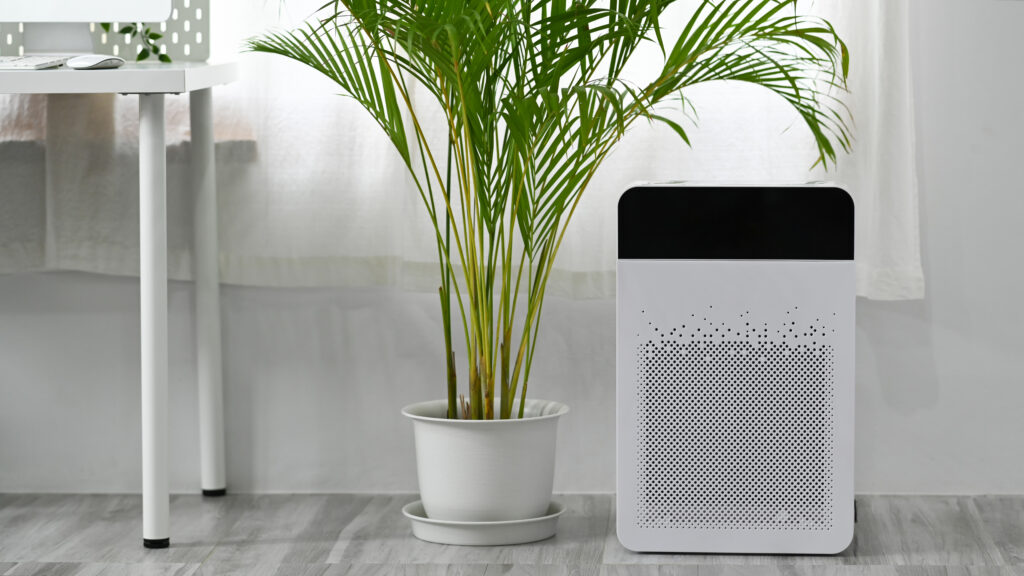
Did you know that the air inside your home can be significantly more polluted than the air outside? Common allergens like pet dander, pollen, and dust mites thrive indoors, creating a haven for respiratory irritants. These pollutants worsen allergy symptoms and can even become breeding grounds for mold, potentially causing health problems.
Unfortunately, traditional cleaning methods often can’t fully address these microscopic threats. That is why you need HEPA filters.
High-Efficiency Particulate Air (HEPA) filters improve indoor air quality by trapping over 99% of airborne particles as small as 0.3 microns. They help prevent allergies and mold buildup and even capture some microbes and viruses.
Let’s explore how HEPA filters function and their benefits to the air quality in your home.
How Do HEPA Filters Work?
Think of a HEPA filter as a super-fine maze for air pollutants – it has a dense web of fibers (typically fiberglass) that are crisscrossed and layered. When air passes through this maze, pollutants get trapped in different ways, including:
- Direct impact: larger particles, like dust, collide directly into the fibers and stick.
- Interception: Mid-size particles, like pollen, follow the airflow but get too close to a fiber and end up getting trapped
- Diffusion: The tiniest particles (think smoke) move in a zig-zag pattern, eventually bumping into a fiber and getting caught.
It’s not just any old filter that earns the HEPA label. To be called a true HEPA filter, it must capture at least 99.97% of particles that are 0.3 microns in size. That’s incredibly small – a human hair is about 50-100 microns wide.
HEPA filters catch:
- Dust & Dust Mites: Say goodbye to those sneeze-inducing dust bunnies and the microscopic mites within them.
- Pet Dander: Fido and Fluffy’s dander won’t stand a chance.
- Pollen: Do seasonal allergies bother you? HEPA filters can bring relief.
- Mold Spores: While HEPA filters cannot remove existing mold, they can help stop mold spores from spreading further.
- Smoke: Reduce secondhand smoke and lingering odors.
What are the Benefits of HEPA Filters?
Say goodbye to stuffy noses and sneezing fits. Here are the benefits of HEPA filters:
- Improved Air Quality: HEPA filters snag a wide range of pollutants, such as smoke particles and other irritants that can affect everyone’s lungs. Think of it as a deep cleaning of the air in your home.
- Allergy Relief: If dust mites, pollen, and pet dander are your worst enemies, a HEPA filter is your new best friend. By trapping these allergens, it reduces the triggers that cause your sneezing, wheezing, and itchy eyes.
- Reduced Mold: While HEPA filters can’t magically fix existing mold, they are a vital part of a mold control strategy. By catching those floating mold spores, they help prevent new colonies from taking root in your home.
- Odor Reduction: Some HEPA filters go the extra mile by coming with an activated carbon layer. This layer absorbs lingering odors from pets, cooking, or smoke, leaving your home smelling fresher.
Do HEPA Filters Remove Viruses and Microbes?
Can HEPA filters protect against viruses and other microbes? The answer, like many things, depends. HEPA filters are excellent at trapping airborne particles, including some viruses and microbes, such as bacteria and fungi.
However, size matters! Some viruses are large enough to be captured, particularly when they hitch a ride on larger moisture droplets. However, some viruses slip right through because they are smaller than the 0.3-micron HEPA standard. The same goes for microbes – while some are trapped, others are small enough to bypass the filter.
The key takeaway here is that HEPA filters can help reduce airborne viruses and microbes in your home, but they are not a foolproof solution. Think of them as a valuable tool in a broader plan for healthier indoor air.
Do HEPA Filters Remove Mold?
Mold can be a frustrating and potentially harmful presence in your home. A HEPA filter can help address this problem, but you must find a solution to the source of the mold.
HEPA filters trap airborne spores, preventing them from circulating and spreading, forming new mold colonies in other areas of your home. However, a HEPA filter will not stop existing mold from growing. You must address what is causing the mold to grow in the first place. You can do it yourself or seek professional mold remediation services.
Factors to Consider Before Buying a HEPA Filter
HEPA filters are not a one-size-fits-all. Consider the following factors when choosing the best HEPA filter for your needs:
- Room Size: Match Power to Space
Air purifiers have a coverage rating (usually in square feet). Don’t get one that’s too small for your room – it will have to work overtime to make a difference. A little extra capacity is always a good idea.
- CADR Rating: It’s All About the Power
CADR stands for Clean Air Delivery Rate. This tells you how quickly the purifier cleans the air of specific pollutants (like dust, pollen, and smoke). The higher the CADR, the more powerful the cleaning.
- Noise Level:
If you’re using it in your bedroom or a quiet space, look for noise level ratings in decibels. Some have whisper-quiet modes for undisturbed sleep.
- Additional Features: The Bells and Whistles
Think about what would make your life easier:
- Smart features: Control it through your phone or connect to your smart home setup.
- Filter Change Indicators: No more guessing when it’s time for a fresh filter.
- Timer Settings: Schedule it for specific times of day.
The Takeaway: HEPA Filters are Your Key to a Healthier Home Environment
From troublesome allergens to lingering odors, HEPA filters give you the power to create a cleaner, healthier breathing space. They trap dust, dander, pollen, and some microbes and even reduce potential mold spread. While not a magical solution for every air quality problem, HEPA filtration is a valuable weapon in your arsenal for fresh, breathable air indoors.

